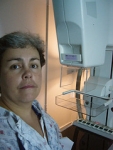A Guide To Your Breasts (For All )

The Real Focus Of Self-Exams:
You have known for a long time that you should do a monthly breast self-exams to look for lumps. Women should look for some kind of change in the appearance or feel in the breast. Example: An inverted nipple or breasts that suddenly become different sizes. One of the greatest concerns is inflammatory breast cancer (IBC), a a type of breast cancer undetectable by a mammogram, which can strike women who are younger than 40, the standard age at which annual exams are recommended for women. This type of cancer afflicts about five percent of women diagnosed with the disease. It is one of the most aggressive and lethal breast cancers. IBC can initially look like a mosquito bite or rash on the breast and not as a lump inside it. It can also manifest a symptom called peau d’orange, a skin texture that resembles the dimpling of an orange. The timing of monthly self-checks is critical. Don’t perform the exam the few days before a menstrual cycle, since the breasts tend to be swollen and tender then. False-positives occur more often just before the period. The ideal time is when breast discomfort related to a menstrual cycle has gone.

Breast Cancer Fact File:
Worldwide, breast cancer is the second most common type of cancer after lung cancer (among both sexes) and the fifth most common cause of cancer death. Breast cancer is the most common cancer amongst women, with an incidence rate more than twice of colorectal cancer and cervical cancer and about three times that of lung cancer. However, breast cancer mortality worldwide is just 25 percent greater than that of lung cancer in women. Studies correlate lower age of first childbirth (less than 24 years), having more children (7 percent lowered risk per child), and breast feeding (4 percent per breast feeding year) to lowered breast cancer risk.

Advancements In Breast Cancer Research:
Within the last year: For breast cancer survivors, treatment with the drug Femara appears to reduce the risk of breast cancer returning or spreading, even up to seven years after the patient has stopped taking the usual five years of treatment with the well-known cancer-prevention drug, Tamoxifen. The drug Herceptin, combined with two chemotherapy drugs, has been found to increase the survival rates among women with the type of breast cancer known as HER2-positive. Interestingly, the bone-cancer drug Zometa has been found helpful in keeping early-stage breast cancer from recurring in pre menopausal women.